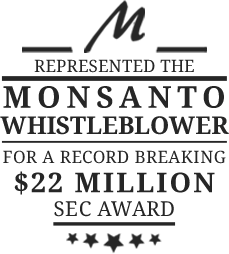








Explaining the SEC’s Office of the Whistleblower
In 2010, the Dodd-Frank Act was signed into law, and with it, the Security and Exchange Commission’s (SEC) Office of the Whistleblower was born. Since then, the Whistleblower Office has issued millions of dollars in rewards to whistleblowers, sometimes reaching into the tens of millions for individual rewards.
Ever since the 2008 financial crisis, animosity toward Wall Street and the financial industry has never been higher. Many people forget just how young the Office of the Whistleblower is and what life was like for whistleblowers prior to its foundation.
Before the Office of the Whistleblower
It’s often forgotten, but the SEC actually did have a whistleblower bounty program prior to Dodd-Frank. The program never received much attention, however, and whistleblower tips were few and far between.
As a result, whistleblower bounties were rarely issued. In all likelihood, the lack of rewards issued was also partially responsible for the program’s anonymity, thereby ensuring the program would languish in obscurity.
The Office of the Whistleblower Is Born
Once the financial markets crashed in 2008, it became obvious that more effort needed to be made in encouraging whistleblowers to come forward. Lawmakers worked with experienced advisors to develop a system of rewards and legal protections, which eventually produced the Dodd-Frank Act.
The legislation included a provision that established the SEC’s Office of the Whistleblower. The Office would regulate the financial industry and enforce federal anti-fraud provisions. Because the industry is so vast and complicated, the SEC Whistleblower Program included several sections intended to encourage whistleblowers to provide the SEC with relevant information regarding fraud.
Tips, Complaints, and Referrals
The Office accepts securities fraud tips through a number of different means, but most whistleblowers choose to work through a whistleblower attorney, as doing so allows the tipster to remain anonymous.
Whistleblower lawyers submit tips through a Form TCR, which is then considered by the SEC’s attorneys and experts. If they decide the tip has merit, an investigation will be launched in order to determine if fraud is taking place and what its extent is.
If fraud is found, the guilty entity will be penalized, often involving monetary sanctions. Depending on how complete and original the whistleblower’s information was and whether he or she was helpful during the investigation, the whistleblower can then claim a whistleblower bounty if more than one million dollars was collected by the SEC. The whistleblower’s reward will be between 10 and 30 percent of this amount.
Contact the SEC’s Office of the Whistleblower
If you have knowledge of securities fraud or corporate corruption that represents a danger to investors, the Office of the Whistleblower might reward you for what you know. An attorney from Meissner Associates can protect your identity while helping you maximize your reward.
To learn more, just contact us to arrange a free, confidential tip evaluation. We’ll help you determine how good your information is with no risks involved. To get started, just complete the form below or call us at 1-866-764-3100.
